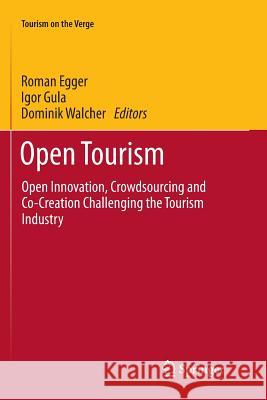Open Tourism: Open Innovation, Crowdsourcing and Co-Creation Challenging the Tourism Industry » książka
topmenu
Open Tourism: Open Innovation, Crowdsourcing and Co-Creation Challenging the Tourism Industry
ISBN-13: 9783662568668 / Angielski / Miękka / 2018 / 476 str.
Kategorie:
Kategorie BISAC:
Wydawca:
Springer
Seria wydawnicza:
Język:
Angielski
ISBN-13:
9783662568668
Rok wydania:
2018
Wydanie:
Softcover Repri
Ilość stron:
476
Waga:
0.70 kg
Wymiary:
23.39 x 15.6 x 2.59
Oprawa:
Miękka
Wolumenów:
01
Dodatkowe informacje:
Wydanie ilustrowane











